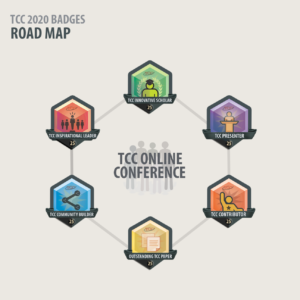 For the ninth year, TCC participants may earn digital credentials (aka badges) by presenting their work and contributing to building the conference community. TCC digital credentials recognize individuals who are forward-thinking, produced quality research, or demonstrate community-related skills during conference activities. For general information about digital credentials, see Educause’s 7 Things About Badges & Professional Development.
For the ninth year, TCC participants may earn digital credentials (aka badges) by presenting their work and contributing to building the conference community. TCC digital credentials recognize individuals who are forward-thinking, produced quality research, or demonstrate community-related skills during conference activities. For general information about digital credentials, see Educause’s 7 Things About Badges & Professional Development.
TCC Hawaii is fortunate to partner with Credly, a leader in workforce and academic micro-credentialing. Credly staffers are shared with LearningTimes, our partner for the TCC Online Conference since 2005. Credly has partnered with the American Council on Education (ACE) to recognize workforce training. Credly also supported the Educause Learning Initiative (ELI) to recognize professional achievement in academia. Credlyʻs Acclaim Platform also integrates with Canvas LMS.
Dr. Susan Manning, Credly’s Chief Success Strategist, explains the digital credential and how to put it to work.
TCC Digital Credentials
TCC issues digital badges to conference participants based on achievement or by nominations from other attendees. Did you really enjoy a certain presentation? Nominate the presenter for a digital badge to show your support and recognize outstanding work. Was there a facilitator who assisted presenters by providing both technical and emotional support? Engage with participants in discussion threads, blog posts, and social media about your conference experience to earn other digital badges.
These digital credentials are designed around the goals and values of the TCC Online Conference to celebrate professional development, global community-building, and increasing our knowledge of the use of modern technology for teaching, learning, creative expression and building 21st Century learning skills.
TCC Digital Credentials Constellation
For details about TCC digital credentials and how to earn them.
The 25th Annual TCC 2020 Worldwide Online Conference | April 14-16, 2020 | #tccsilver
How to Claim Badges
Qualified individuals will receive a claim code from the TCC Conference Staff or Coordinators.
Upon receiving a claim code, go to Credly.com and create a new account or use one previously created. After signing in, select CLAIM CREDIT at the top menu and enter the code. Follow the directions provided.
Badges received from Credly and other sources may be stored at an “open badge” compliant repository such as Badgr, formerly known as the Mozilla Backpack.
Your collection of badges may then be used as evidence of achievement with an employer or organization that recognizes digital credentials.
How to Recognize Colleagues for Inspirational Leadership
To nominate an outstanding presenter (memorable and highly engaged audience) or an individual that goes above and beyond a participant’s role by engaging and supporting participants in conference activities, send email to the badge administrator, Johnny <tcc.schedule@gmail.com>.
Provide a brief paragraph in support of your nomination. Include the name of the individual and title of the presentation or reasons for the nomination. The nominated individual will receive the claim code for an Inspirational Leader microcredential by email.
For More Information About Digital Credentials
- Acree, L. (2016). Seven lessons learned from implementing micro-credentials. The Friday Institute for Educational Innovation, NC State University College of Education. Retrieved from https://www.fi.ncsu.edu/wp-content/uploads/2016/02/microcredentials.pdf
- Davis, M. (2017, September 26). Students earn digital credentials for adding new skills. Educational Week. Retrieved from https://www.edweek.org/ew/articles/2017/09/27/students-earn-digital-credentials-for-adding-new.html
- Dyjur, P. & Lindstrom, G. (2017). Perceptions and uses of digital badges for professional learning development in higher education. TechTrends, 61, 386-392. http://doi.org/10.1007/s11528-017-0168-2
- EDUCAUSE. (2019). 7 things you should know about badging for professional development. Retrieved from https://library.educause.edu/-/media/files/library/2019/7/eli7168.pdf
- EDUCAUSE. (2017). 7 things you should read about microcredentialing/digital badging. Retrieved from https://library.educause.edu/~/media/files/library/2017/7/elir1704.pdf
- Nyren, H. (2018, April 4). Digital badges for visible skills: Credly’s founder & CEO shares their vision for giving credit where it’s due. EdTech Times. Retrieved from https://edtechtimes.com/2018/04/04/digital-badges-for-visible-skills-credlys-founder-ceo-shares-his-vision-for-giving-credit-where-its-due/
- Panke, S (2019, April 2). Alternative Credentials: How Can Higher Education Organizations Leverage Open Badges? AACE Review. Retrieved from https://www.aace.org/review/alternative-credentials-how-can-higher-education-organizations-leverage-open-badges/
- Povich, E. (2017, September 28). To improve teacher training, states try ‘micro credentials.’ HuffPost. Retrieved from https://www.huffingtonpost.com/entry/to-improve-teacher-training-states-try-micro-credentials_us_59cd49b6e4b0149549227e4d
- Ullrich, E. (2017, October 19). Get Started With Digital Badges! Retrieved from https://www.hackerlab.org/en/blog/read/477819342/get-started-with-digital-badges
- WCET. (2017, October 5). Digital credentials for faculty professional development. Retrieved from https://wcetfrontiers.org/2017/10/05/digital-credentials-for-faculty-pd/
